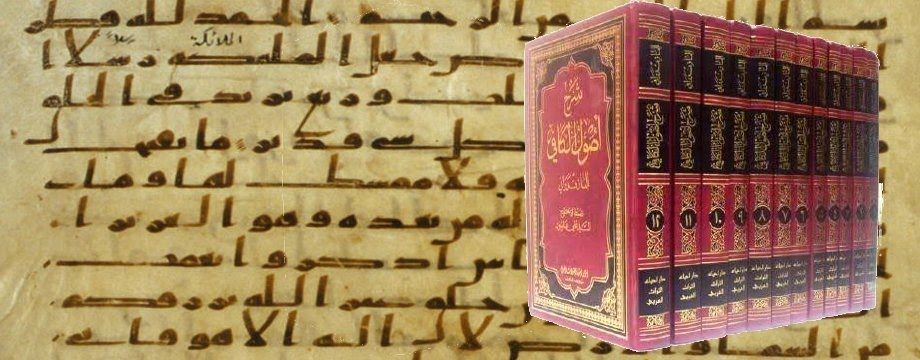Kulayni reports the following in al-Kafi (vol. 1 p. 401)
قَالَ أَبُو جَعْفَرٍ ع قَالَ رَسُولُ اللَّهِ ص إِنَّ حَدِيثَ آلِ مُحَمَّدٍ صَعْبٌ مُسْتَصْعَبٌ لَا يُؤْمِنُ بِهِ إِلَّا مَلَكٌ مُقَرَّبٌ أَوْ نَبِيٌّ مُرْسَلٌ أَوْ عَبْدٌ امْتَحَنَ اللَّهُ قَلْبَهُ لِلْإِيمَانِ فَمَا وَرَدَ عَلَيْكُمْ مِنْ حَدِيثِ آلِ مُحَمَّدٍ ص فَلَانَتْ لَهُ قُلُوبُكُمْ وَ عَرَفْتُمُوهُ فَاقْبَلُوهُ وَ مَا اشْمَأَزَّتْ مِنْهُ قُلُوبُكُمْ وَ أَنْكَرْتُمُوهُ فَرُدُّوهُ إِلَى اللَّهِ وَ إِلَى الرَّسُولِ وَ إِلَى الْعَالِمِ مِنْ آلِ مُحَمَّدٍ وَ إِنَّمَا الْهَالِكُ أَنْ يُحَدِّثَ أَحَدُكُمْ بِشَيْءٍ مِنْهُ لَا يَحْتَمِلُهُ فَيَقُولَ وَ اللَّهِ مَا كَانَ هَذَا وَ اللَّهِ مَا كَانَ هَذَا وَ الْإِنْكَارُ هُوَ الْكُفْرُ
Note that this narration, like many other similar narrations contains the phrase ṣa’bun mustaṣ‘ab which can be translated as difficult and hard to bear. In the above ḥadīth, we are told that the ‘narrations’ of Ahl al-Bayt are difficult to bear except for three categories, namely: the archangels, the messengers and the believers whose hearts have been tested for faith. So if you hear something from the Ahl al-Bayt (‘a) and it appeals to you, accept it and if it evokes a sense of distaste and you doubt it, then leave it to Allah and the Prophet for indeed it is wrong for anyone to deny something that they have no understanding of.
Scholars have interpreted the term ḥadīthanā in three ways:
1) Some have taken the pronoun in ḥadīthanā to be an iḍāfah lāmiyyah meaning “our speech” or “our traditions” and as such the way they interprete this narration is that it is difficult to ‘understand’ the traditions of the Ahl al-Bayt (‘a) except for the three categories that have been mentioned.
2) Others have taken the pronoun to be iḍāfah ẓarfiyyah meaning “speech pertaining to us” or “traditions about us” and have thus interpreted the narration to mean that it is difficult to ‘bear’ the traditions that mention the numerous virtues (faḍā’il) of the Ahl al-Bayt (‘a) except for the three groups that have been mentioned.
3) Yet other scholars have interpreted the word ḥadīthanā to mean the wilāyah of the Ahl al-Bayt (‘a).
In order to understand this narration and arrive at its correct interpretation, we need to look at other narrations that are similar and this will give us a better idea of what meant by this ḥadīth. For example, two similar narrations are as follows:
a) In Nahj al-Balāgha, Amīr al-Mu’minīn (‘a) says:
إِنَّ أَمْرَنَا صَعْبٌ مُسْتَصْعَبٌ لَا يَحْمِلُهُ إِلَّا عَبْدٌ مُؤْمِنٌ امْتَحَنَ اللَّهُ قَلْبَهُ لِلْإِيمَانِ وَ لَا يَعِي حَدِيثَنَا إِلَّا صُدُورٌ أَمِينَةٌ وَ أَحْلَامٌ رَزِينَةٌ
b) In Baṣā’ir al-Darajāt there is a narration in which Imām al-Bāqir (‘a) says:
عَنْ أَبِي بَصِيرٍ قَالَ قَالَ أَبُو جَعْفَرٍ ع إِنَّ أَمْرَنَا صَعْبٌ مُسْتَصْعَبٌ عَلَى الْكَافِرِ لَا يُقِرُّ بِأَمْرِنَا إِلَّا نَبِيٌّ مُرْسَلٌ أَوْ مَلَكٌ مُقَرَّبٌ أَوْ عَبْدٌ مُؤْمِنٌ امْتَحَنَ اللَّهُ قَلْبَهُ لِلْإِيمَانِ
What we notice from these two similar narrations is that the word amranā has been used in place of ḥadīthanā in some and this gives the impression that the second or third interpretation mentioned above is correct. In the second narration (from Baṣā’ir al-Darajāt) we notice an addition i.e. …‘alā al-Kāfir, Lā yuqirru bihi illā… meaning that the affair or narration(s) about the Ahl al-Bayt (‘a) are difficult to bear for the disbelievers (not difficult to understand, because there is no difference between a believer and a disbeliever as far as the faculties of intelligence and understanding is concerned), and none but the three groups testify to it.
In conclusion therefore, we see that this narration is not talking about the aḥādīth of the Ahl al-Bayt (‘a) being difficult to understand. Rather, it is their virtues, the foremost of them being their wilāyah and divinely given authority, that are difficult for people to bear.

